Let’s cut through the noise and get straight to the point:
If you’re running an eCommerce business in 2024 and you’re not leveraging email marketing, you’re leaving money on the table.
Period.
Email marketing isn’t just another marketing channel.
It’s the lifeblood of your customer relationships and a direct line to your revenue.
In fact, for every $1 spent on email marketing, the average return is $42.
That’s a 4,200% ROI.
Show me another marketing channel that can touch that.
But here’s the kicker:
Not all email marketing platforms are created equal, especially when it comes to eCommerce.
You need a platform that understands the unique challenges and opportunities of selling online.
That’s why I’ve put together this no-BS guide to the best email marketing platforms for eCommerce in 2024.
I’m not here to waste your time with fluff.
I’m here to give you the actionable insights you need to choose the right platform and start driving real results for your business.
So, buckle up.
What Makes a Great eCommerce Email Marketing Platform?
Before we jump into the list, let’s get clear on what we’re looking for.
When it comes to the best email marketing platforms for eCommerce, there are specific features and capabilities that separate the wheat from the chaff.
Here’s what I considered when putting this list together:
eCommerce Integration
- Seamless connection with major eCommerce platforms (Shopify, WooCommerce, Magento, etc.)
- Ability to sync product data and customer information
Automation Capabilities
- Advanced workflows for abandoned cart recovery, post-purchase follow-ups, and customer win-back campaigns
- Behavioral triggers based on customer actions
Segmentation and Personalization
- Granular segmentation options based on purchase history, browsing behavior, and customer data
- Dynamic content capabilities for hyper-personalized emails
Analytics and Reporting
- In-depth metrics on email performance, revenue attribution, and customer lifetime value
- A/B testing capabilities for continuous optimization
User-Friendly Interface
- Intuitive email builder with eCommerce-specific templates
- Easy-to-use segmentation and automation tools
Deliverability
- Strong sender reputation and tools to maintain high inbox placement rates
Scalability
- Ability to handle growing subscriber lists and increasing email volumes
- Pricing plans that accommodate business growth
Customer Support
- Responsive support team with eCommerce expertise
- Comprehensive knowledge base and resources
Why do these criteria matter for eCommerce businesses?
Simple.
Your email marketing platform isn’t just a tool.
It’s a revenue-generating machine.
You need a platform that can handle the complexities of eCommerce marketing:
- Syncing real-time product data
- Crafting personalized recommendations
- Recovering abandoned carts
- Nurturing customers through the entire lifecycle
A generic email platform won’t cut it.
You need a specialized eCommerce email marketing powerhouse.
Now, let’s get into the platforms that meet these criteria and can help you crush your eCommerce goals.
1. Mailchimp: The All-in-One Marketing Platform
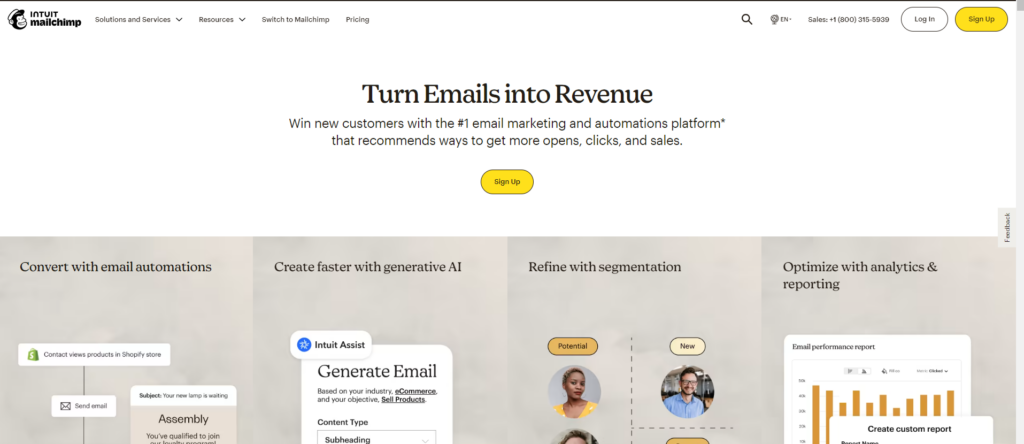
When it comes to email marketing platforms for eCommerce, Mailchimp is often the first name that comes to mind.
And for good reason.
Mailchimp has evolved from a simple email service provider to a comprehensive marketing platform tailored for eCommerce businesses.
Here’s why Mailchimp earns its spot on this list:
Key Features for eCommerce
- Seamless Integration: Mailchimp plays nice with virtually every major eCommerce platform out there. Shopify, WooCommerce, Magento – you name it, Mailchimp connects with it.
- Advanced Automation: Set up powerful automated workflows for abandoned cart recovery, product recommendations, and customer re-engagement. These aren’t just basic autoresponders; they’re intelligent sequences that adapt based on customer behavior.
- Customer Journey Builder: Map out complex, multi-step campaigns that guide customers from first purchase to loyal fan. It’s like having a marketing strategist working 24/7.
- Predictive Analytics: Leverage AI-powered insights to identify your most valuable customers and predict future purchase behavior. This isn’t guesswork; it’s data-driven decision making at its finest.
- Multichannel Marketing: Mailchimp isn’t just about email. It offers integrated tools for social media advertising, postcards, and even landing pages. It’s a true omnichannel solution.
Why Mailchimp Stands Out
- User-Friendly Interface: Mailchimp’s drag-and-drop email builder is intuitive enough for beginners but powerful enough for pros. You don’t need to be a tech wizard to create stunning, conversion-focused emails.
- Scalability: Whether you’re just starting out or running a multi-million dollar operation, Mailchimp has a plan that fits. Their pricing structure grows with your business, making it a solid long-term choice.
- Robust Analytics: Mailchimp’s reporting goes beyond basic open and click rates. You get deep insights into revenue attribution, customer lifetime value, and campaign performance across channels.
- Continuous Innovation: Mailchimp is constantly rolling out new features and improvements. They’re not resting on their laurels; they’re pushing the boundaries of what an email marketing platform can do.
Who Should Consider Mailchimp?
- Small to Medium-Sized eCommerce Businesses: If you’re looking for an all-in-one solution that can handle email, social media, and more, Mailchimp is a solid choice.
- Marketers Who Value Simplicity: While Mailchimp offers advanced features, its interface remains user-friendly. It’s perfect for those who want power without complexity.
- Growing Businesses: Mailchimp’s scalable pricing and feature set make it an excellent choice for businesses expecting significant growth.
Potential Drawbacks
No platform is perfect, and Mailchimp has its limitations:
- Advanced Segmentation: While Mailchimp offers decent segmentation options, some specialized eCommerce platforms provide more granular control.
- Cost at Scale: As your subscriber list grows, Mailchimp can become pricier compared to some alternatives.
- Limited A/B Testing: While available, A/B testing features aren’t as robust as some competitors.
The Bottom Line
Mailchimp is a versatile, user-friendly platform that offers a solid foundation for eCommerce email marketing.
It’s not the most advanced option out there, but it strikes a balance between power and ease of use that many businesses find appealing.
If you’re looking for a well-rounded platform that can grow with your business, Mailchimp deserves a spot on your shortlist of best email marketing platforms for eCommerce.
2. Klaviyo: The eCommerce Email Marketing Specialist
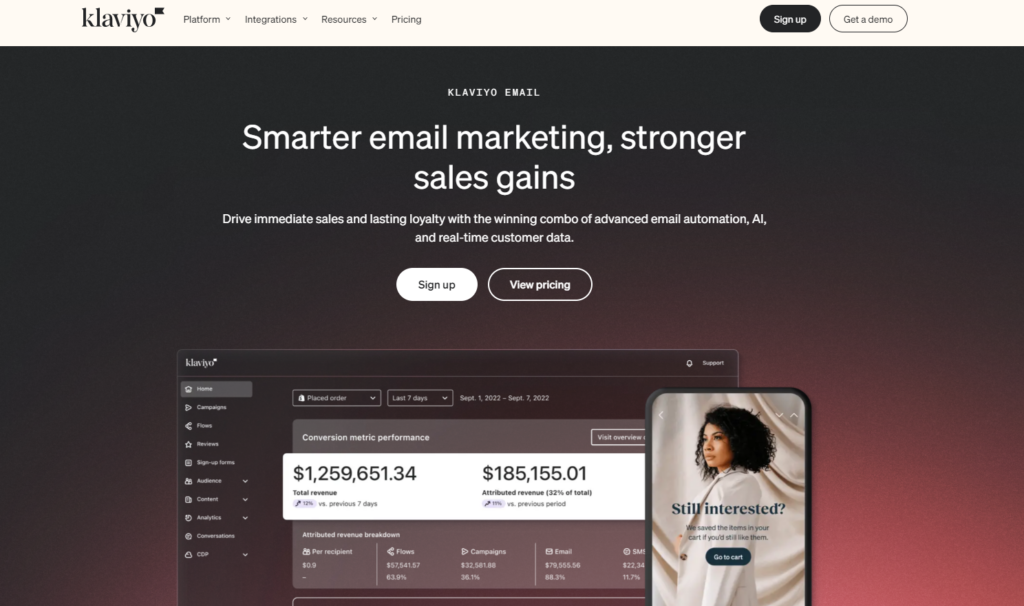
If Mailchimp is the Swiss Army knife of email marketing, Klaviyo is the precision-engineered tool built specifically for eCommerce.
This platform was designed from the ground up with online retailers in mind, and it shows in every feature and capability.
Let’s break down why Klaviyo is a powerhouse among email marketing platforms for eCommerce:
Key Features for eCommerce
- Deep eCommerce Integrations: Klaviyo doesn’t just connect with eCommerce platforms; it syncs deeply. Product data, customer information, and purchase history flow seamlessly into Klaviyo, giving you a 360-degree view of your customers.
- Hyper-Personalization: Leverage customer data to create highly personalized emails. Dynamic product recommendations, personalized discounts, and behavior-triggered content are all possible with Klaviyo.
- Advanced Segmentation: Create laser-focused segments based on purchase history, browsing behavior, engagement levels, and more. The level of granularity here is unmatched.
- Predictive Analytics: Klaviyo’s machine learning algorithms can predict customer lifetime value, churn risk, and even the next best product to recommend. It’s like having a crystal ball for your eCommerce business.
- Flow Builder: Create complex, multi-step automation flows with ease. From welcome series to post-purchase follow-ups, Klaviyo’s visual flow builder makes it simple to map out sophisticated customer journeys.
Why Klaviyo Stands Out
- eCommerce Focus: Every feature in Klaviyo is designed with eCommerce in mind. It’s not trying to be all things to all businesses; it’s laser-focused on helping online retailers drive revenue.
- Revenue Attribution: Klaviyo’s reporting goes beyond vanity metrics. You can see exactly how much revenue each email, segment, and automation flow is generating.
- Real-Time Data: Klaviyo updates customer profiles in real-time as they interact with your store. This means your emails can always reflect the most current customer data and behavior.
- A/B Testing on Steroids: Test everything from subject lines to send times to entire flow structures. Klaviyo’s robust testing capabilities allow for continuous optimization.
Who Should Consider Klaviyo?
- Serious eCommerce Players: If your business lives and breathes eCommerce, Klaviyo speaks your language. It’s ideal for businesses that want to leverage every bit of customer data to drive sales.
- Data-Driven Marketers: If you love digging into metrics and optimizing based on hard data, Klaviyo provides the depth of analytics you crave.
- Businesses with Complex Product Catalogs: Klaviyo excels at handling large product catalogs and creating personalized product recommendations.
Potential Drawbacks
Klaviyo is powerful, but it’s not without its challenges:
- Learning Curve: With great power comes a steeper learning curve. Klaviyo can be overwhelming for beginners.
- Cost: Klaviyo’s pricing is based on the number of contacts, which can get expensive as your list grows.
- Limited Multi-Channel Features: While excellent for email, Klaviyo’s capabilities in other marketing channels are less developed compared to all-in-one platforms.
The Bottom Line
Klaviyo is the Ferrari of eCommerce email marketing platforms.
It’s fast, powerful, and precision-engineered for online retail.
If you’re serious about leveraging email to drive eCommerce revenue and you’re willing to invest the time to master its capabilities, Klaviyo could be the game-changer your business needs.
For many eCommerce businesses, Klaviyo represents the gold standard among best email marketing platforms for eCommerce.
3. Omnisend: The Rising Star in eCommerce Email Marketing
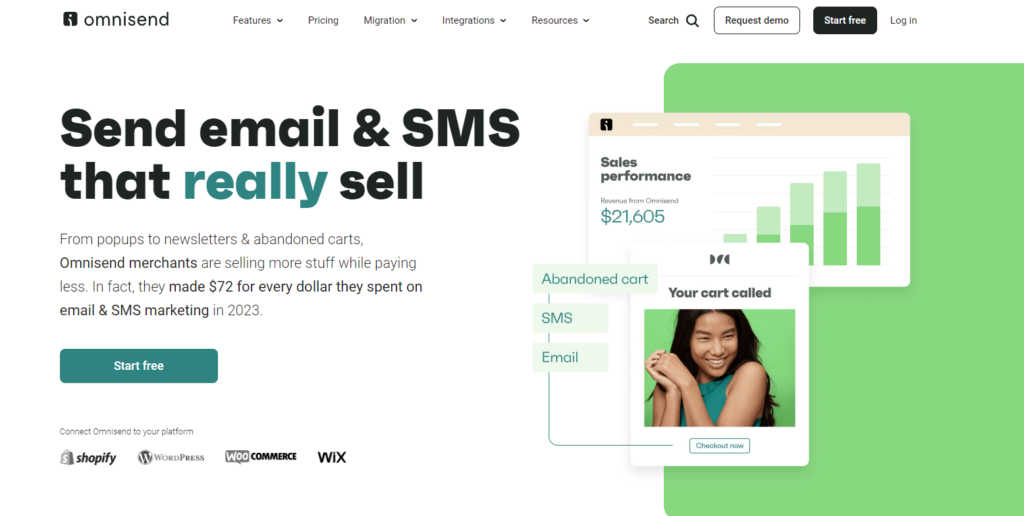
In the world of email marketing platforms for eCommerce, Omnisend is like that new kid on the block who quickly becomes the coolest in school.
It’s relatively younger compared to some giants in the field, but don’t let that fool you.
Omnisend has rapidly gained traction among eCommerce businesses for its laser focus on online retail and its innovative features.
Let’s dive into what makes Omnisend a contender for the title of best email marketing platform for eCommerce:
Key Features for eCommerce
- Omnichannel Marketing: Omnisend goes beyond email, offering integrated SMS, web push notifications, and Facebook Messenger campaigns. It’s not just about email; it’s about reaching customers wherever they are.
- Product Picker: Easily add products from your store directly into your emails. This feature is a game-changer for creating product-focused campaigns quickly.
- Dynamic Discount Codes: Generate unique, single-use discount codes for each recipient. This prevents code sharing and allows for more precise tracking of promotion effectiveness.
- Advanced Automation Library: Choose from a variety of pre-built automation workflows designed specifically for eCommerce. From welcome series to cart abandonment, these templates give you a head start on effective email marketing.
- Campaign Booster: Automatically resend campaigns to non-openers with different subject lines. This feature can significantly increase the reach and effectiveness of your campaigns.
Why Omnisend Stands Out
- eCommerce-Centric Design: Every feature in Omnisend is built with eCommerce in mind. It’s not adapting general email marketing features to fit eCommerce; it’s purpose-built for online retail.
- User-Friendly Interface: Despite its powerful features, Omnisend maintains an intuitive, easy-to-navigate interface. It strikes a balance between simplicity and functionality that many users appreciate.
- Innovative Features: Omnisend isn’t afraid to introduce unique features like wheel of fortune sign-up forms or product recommendation blocks that stand out in the inbox.
- Strong Segmentation: Create highly targeted segments based on customer behavior, purchase history, and engagement levels. This allows for precise targeting and personalization.
Who Should Consider Omnisend?
- eCommerce Businesses Seeking Simplicity: If you want powerful eCommerce-focused features without the complexity of some other platforms, Omnisend could be your sweet spot.
- Marketers Looking for Omnichannel Capabilities: If you’re interested in integrating email with SMS and other channels seamlessly, Omnisend offers this out of the box.
- Growing Online Retailers: Omnisend’s pricing and feature set make it attractive for small to medium-sized eCommerce businesses looking to scale their email marketing efforts.
Potential Drawbacks
While Omnisend shines in many areas, it’s important to consider potential limitations:
- Depth of Analytics: While Omnisend provides solid reporting, it may not offer the same depth of analytics as some more established platforms.
- Advanced Customization: Power users might find some limitations in terms of advanced customization options compared to platforms like Klaviyo.
- Integration Ecosystem: While Omnisend integrates with major eCommerce platforms, its range of third-party integrations isn’t as extensive as some competitors.
The Bottom Line
Omnisend is like that efficient, innovative startup that’s giving the big players a run for their money.
It offers a compelling mix of eCommerce-focused features, user-friendliness, and omnichannel capabilities that many online retailers find attractive.
If you’re looking for a platform that understands eCommerce deeply and offers innovative features without overwhelming complexity, Omnisend deserves serious consideration.
It’s quickly earning its place among the best email marketing platforms for eCommerce, especially for businesses that value simplicity alongside power.
4. Drip: The Personalization Powerhouse
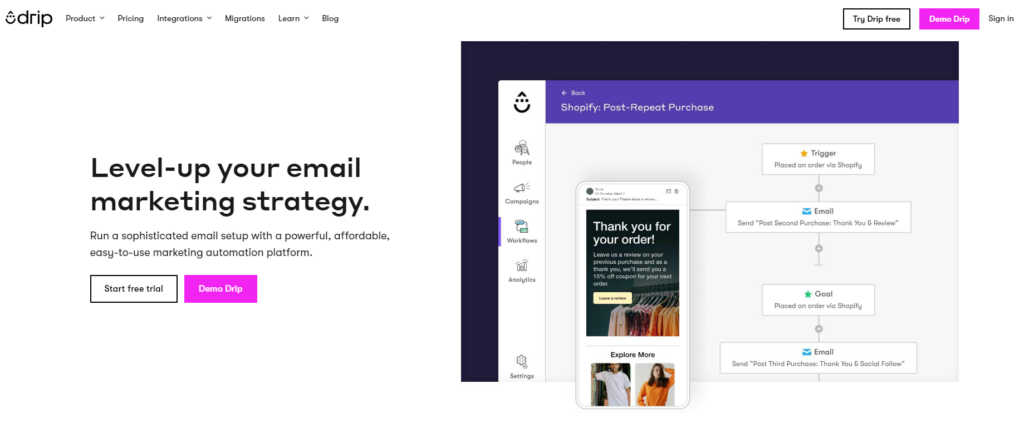
For email marketing platforms for eCommerce, Drip stands out as a specialist in personalization and customer journey orchestration.
If you believe that the future of eCommerce lies in tailoring every interaction to the individual customer (spoiler alert: it does), then Drip deserves your attention.
Let’s unpack what makes Drip a formidable contender in the world of eCommerce email marketing:
Key Features for eCommerce
- Visual Workflow Builder: Create complex, multi-step campaigns with a drag-and-drop interface. This isn’t just about sending emails; it’s about crafting entire customer journeys.
- Behavioral Segmentation: Segment your audience based on fine-grained behaviors like specific page views, product interactions, and purchase patterns. This level of detail allows for hyper-targeted campaigns.
- Dynamic Content Blocks: Personalize email content based on customer data and behavior. Show different products, offers, or messaging to different segments within the same email campaign.
- Revenue Attribution: Track the exact revenue generated by each email, automation, and campaign. This isn’t just about open rates; it’s about dollars and cents.
- Cross-Channel Orchestration: Integrate email with SMS, social ads, and direct mail for a truly omnichannel experience. Drip helps you create cohesive customer experiences across multiple touchpoints.
Why Drip Stands Out
- eCommerce Intelligence: Drip doesn’t just store customer data; it interprets it. The platform provides insights into customer behavior and purchase likelihood, helping you make data-driven decisions.
- Personalization at Scale: With Drip, personalization goes beyond just using a customer’s name. You can tailor entire email experiences based on individual customer profiles and behaviors.
- Ease of Use: Despite its advanced capabilities, Drip maintains a user-friendly interface. The visual workflow builder, in particular, makes it easy to create complex automations without needing to be a tech wizard.
- Focus on Customer Lifetime Value: Drip’s features and analytics are geared towards not just driving one-time purchases, but cultivating long-term customer relationships. This aligns perfectly with the goals of most eCommerce businesses.
Who Should Consider Drip?
- Data-Driven eCommerce Marketers: If you love diving deep into customer data and using those insights to drive your marketing strategy, Drip provides the tools and insights you need.
- Businesses Focused on Customer Journeys: If you see each customer interaction as part of a larger journey rather than isolated events, Drip’s workflow capabilities will resonate with you.
- Multi-Channel Retailers: For businesses that sell across multiple channels (e.g., online store, Amazon, brick-and-mortar), Drip’s ability to consolidate data and create unified customer profiles is invaluable.
Potential Drawbacks
While Drip offers powerful features, it’s important to consider potential limitations:
- Learning Curve: The depth of Drip’s features can be overwhelming for beginners. It may take some time to fully leverage all its capabilities.
- Price Point: Drip’s pricing, while competitive for its feature set, may be higher than some simpler alternatives. It’s an investment that needs to be justified by your use of its advanced features.
- Email Design Options: While Drip offers solid email design capabilities, some users find the email builder less flexible compared to platforms like Mailchimp.
The Bottom Line
Drip is like having a team of data scientists and customer experience experts working tirelessly for your eCommerce business.
It excels in turning customer data into actionable insights and personalized experiences.
If you’re ready to take your eCommerce email marketing to the next level with advanced personalization and customer journey mapping, Drip is a top contender.
For businesses that prioritize data-driven decision making and creating tailored customer experiences, Drip stands out as one of the best email marketing platforms for eCommerce in 2024.
5. ActiveCampaign: The Automation Maestro

This platform has carved out a unique position by combining the robustness of enterprise-level marketing automation with the ease of use typically associated with simpler email tools.
Let’s explore why ActiveCampaign deserves a spot on our list of top eCommerce email marketing platforms:
Key Features for eCommerce
- Advanced Automation Builder: Create intricate, branching automation workflows based on customer behavior, preferences, and data. This isn’t just about sending emails; it’s about creating responsive, adaptive customer journeys.
- CRM Integration: ActiveCampaign includes a built-in CRM, allowing for seamless integration of sales and marketing processes. This is particularly valuable for eCommerce businesses with a sales team handling high-value or B2B customers.
- Predictive Sending: Leverage machine learning to determine the optimal time to send emails to each individual subscriber, maximizing open rates and engagement.
- Site Tracking: Monitor how contacts interact with your website and use this data to trigger automations or personalize content. This feature turns your website into an active part of your email marketing strategy.
- Split Testing: Run sophisticated split tests on your automations, not just your emails. This allows you to optimize entire customer journeys, not just individual messages.
Why ActiveCampaign Stands Out
- Flexibility: ActiveCampaign offers a rare combination of power and flexibility. Whether you’re running a small Shopify store or a multi-channel eCommerce empire, the platform can adapt to your needs.
- Intelligent Reporting: Go beyond basic email metrics with ActiveCampaign’s attribution modeling and customer lifetime value predictions. These insights help you understand the true impact of your email marketing efforts.
- Integration Ecosystem: With over 850+ integrations, ActiveCampaign plays well with virtually every tool in your eCommerce tech stack. This allows for seamless data flow and automation across your entire business.
- Machine Learning Capabilities: ActiveCampaign leverages AI to provide predictive content, win probability scoring, and other advanced features that can give you a competitive edge.
Who Should Consider ActiveCampaign?
- Automation Enthusiasts: If you believe in the power of automation to scale your marketing efforts, ActiveCampaign’s robust automation builder will be a dream come true.
- Data-Driven eCommerce Businesses: The platform’s advanced reporting and predictive capabilities cater to marketers who base their strategies on solid data.
- Growing eCommerce Operations: ActiveCampaign scales well, making it suitable for businesses that are expanding rapidly and need a platform that can grow with them.
Potential Drawbacks
While ActiveCampaign offers powerful features, it’s worth considering some potential challenges:
- Complexity: The sheer number of features and options can be overwhelming, especially for beginners. There’s a learning curve to fully leveraging ActiveCampaign’s capabilities.
- Email Design: While functional, some users find the email design tools less intuitive compared to more design-focused platforms.
- Price: As you scale up in contacts and features, ActiveCampaign can become pricier than some alternatives. It’s an investment that needs to be justified by your use of its advanced features.
The Bottom Line
ActiveCampaign is like having a marketing automation supercomputer at your fingertips.
It’s a robust, flexible platform that can handle everything from simple email newsletters to complex, multi-channel customer journeys.
If you’re serious about leveraging automation to drive your eCommerce marketing efforts, ActiveCampaign deserves a close look.
For businesses ready to dive deep into the world of marketing automation and data-driven decision making, ActiveCampaign stands tall among the best email marketing platforms for eCommerce in 2024.
6. Constant Contact: The Reliable Veteran
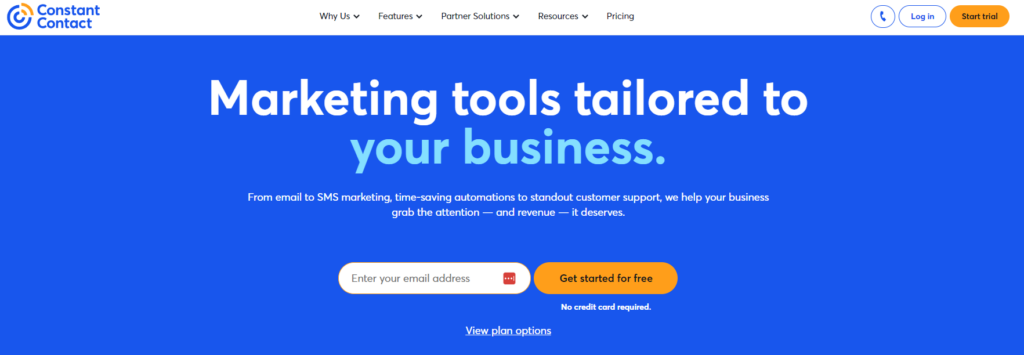
For an email marketing platforms for eCommerce, Constant Contact stands as a seasoned veteran, offering a blend of tried-and-true features with modern eCommerce capabilities.
Let’s explore why this platform continues to be a popular choice for many online retailers:
Key Features for eCommerce
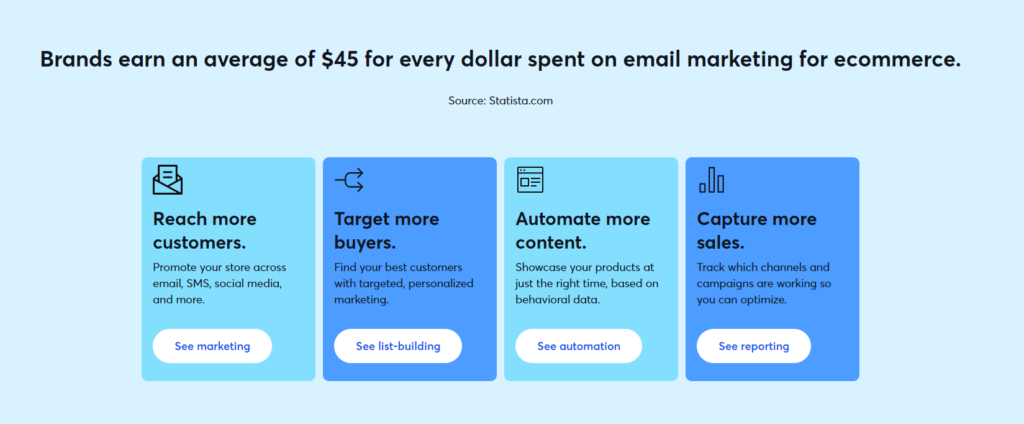
- Intuitive Email Editor: Create professional-looking emails with a drag-and-drop interface that’s easy enough for beginners but powerful enough for experienced marketers.
- eCommerce Integrations: Seamlessly connect with popular platforms like Shopify, WooCommerce, and Magento to sync product data and customer information.
- Automated Email Series: Set up triggered email sequences for welcome series, abandoned carts, and post-purchase follow-ups.
- List Segmentation: Divide your audience based on purchase history, engagement levels, and other custom criteria for more targeted campaigns.
- Real-Time Reporting: Access detailed analytics on email performance, including opens, clicks, and revenue generated.
Why Constant Contact Stands Out
- Reliability: With decades in the email marketing game, Constant Contact has built a reputation for consistent deliverability and uptime.
- User-Friendly Interface: The platform is known for its ease of use, making it accessible even to those new to email marketing.
- Educational Resources: Constant Contact offers a wealth of learning materials, webinars, and support to help users improve their email marketing skills.
- Event Management Tools: For eCommerce businesses that also run events or webinars, Constant Contact’s integrated event management features can be a valuable addition.
Who Should Consider Constant Contact?
- Small to Medium-Sized eCommerce Businesses: Especially those looking for a straightforward, reliable platform without a steep learning curve.
- Retailers New to Email Marketing: The platform’s user-friendly interface and educational resources make it a good starting point for email marketing novices.
- Businesses Valuing Customer Support: Constant Contact is known for its responsive customer service, which can be crucial for businesses without in-house email marketing experts.
Potential Drawbacks
- Limited Advanced Automation: While Constant Contact offers basic automation, it may not be as sophisticated as some eCommerce-specific platforms.
- Pricing Structure: As your list grows, the platform can become more expensive compared to some competitors.
- Design Flexibility: While the email editor is user-friendly, some users find it less flexible for highly custom designs.
7. ConvertKit: The Content Creator’s Choice

While not exclusively an eCommerce platform, ConvertKit has gained popularity among content creators who sell digital products, making it a notable contender in the email marketing platforms for eCommerce space.
Key Features for eCommerce

- Visual Automation Builder: Create complex email sequences and funnels with an intuitive, flowchart-style interface.
- Customizable Opt-In Forms: Design and embed sign-up forms that match your brand and effectively grow your list.
- Tag-Based Segmentation: Use a flexible tagging system to categorize subscribers based on interests, purchases, and behaviors.
- Landing Page Builder: Create dedicated landing pages for product launches or promotions without needing additional software.
- Commerce Features: Sell digital products directly through ConvertKit, integrating seamlessly with your email marketing efforts.
Why ConvertKit Stands Out
- Simplicity with Power: ConvertKit strikes a balance between ease of use and powerful features, making it appealing to solo entrepreneurs and small teams.
- Creator-Focused: The platform is designed with the needs of content creators in mind, which often aligns well with digital product sellers.
- Subscriber-Centric Model: Unlike some platforms that charge based on total subscribers, ConvertKit only counts each subscriber once, regardless of how many lists they’re on.
- Strong Deliverability: ConvertKit maintains a good reputation for email deliverability, crucial for ensuring your messages reach your audience.
Who Should Consider ConvertKit?
- Digital Product Sellers: Especially those who are also content creators, such as course creators, authors, or coaches.
- eCommerce Businesses with a Strong Content Focus: If your marketing strategy heavily involves content marketing alongside product sales, ConvertKit’s features align well.
- Solo Entrepreneurs and Small Teams: The platform’s user-friendly interface and streamlined features make it manageable for smaller operations.
Potential Drawbacks
- Limited eCommerce-Specific Features: While great for digital products, ConvertKit may lack some advanced features needed for larger eCommerce operations.
- Basic Reporting: The analytics provided, while useful, are not as in-depth as some eCommerce-focused platforms.
- Limited Design Options: The email templates, while functional, offer less design flexibility compared to some other platforms.
8. Brevo (formerly Sendinblue): The All-in-One Marketing Suite
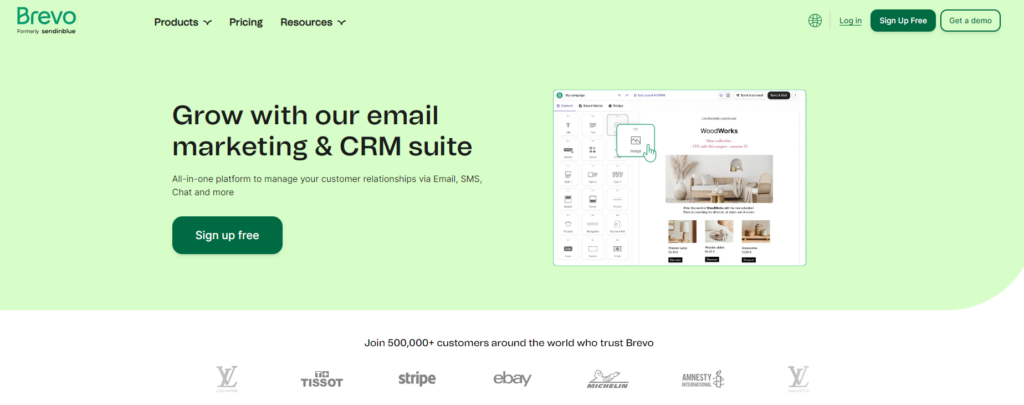
Brevo has evolved from a transactional email service to a comprehensive marketing platform, earning its place among the best email marketing platforms for eCommerce with its diverse feature set.
Key Features for eCommerce
- Powerful Automation Workflows: Create complex, multi-step automations based on user behavior and data.
- Transactional and Marketing Emails: Manage both transactional and marketing emails from a single platform.
- SMS Marketing Integration: Seamlessly combine email and SMS campaigns for a multi-channel approach.
- CRM Functionality: Built-in CRM features help manage customer relationships alongside email marketing efforts.
- Advanced Segmentation: Create highly targeted segments based on detailed customer data and behaviors.
Why Brevo Stands Out
- Comprehensive Toolkit: Brevo offers a wide range of marketing tools beyond just email, including SMS, chat, and CRM features.
- Affordable Scaling: The platform’s pricing structure, based on email volume rather than contacts, can be cost-effective for businesses with large lists.
- Strong Deliverability: Brevo puts a strong emphasis on maintaining high deliverability rates, crucial for eCommerce success.
- AI-Powered Send Time Optimization: Leverage machine learning to determine the best time to send emails to individual subscribers.
Who Should Consider Brevo?
- Growing eCommerce Businesses: Especially those looking for an all-in-one marketing solution that can scale with them.
- Multi-Channel Marketers: If you’re looking to integrate email, SMS, and other channels seamlessly, Brevo offers this capability out of the box.
- Businesses with Variable Email Volume: The pricing based on email volume rather than contacts can be advantageous for businesses with seasonal fluctuations.
Potential Drawbacks
- Learning Curve: The wide range of features can be overwhelming for beginners.
- Template Design: While functional, some users find the email design options less intuitive compared to other platforms.
- Limited Native Integrations: While improving, Brevo’s integration ecosystem isn’t as extensive as some competitors.
9. GetResponse: The Conversion-Focused Platform
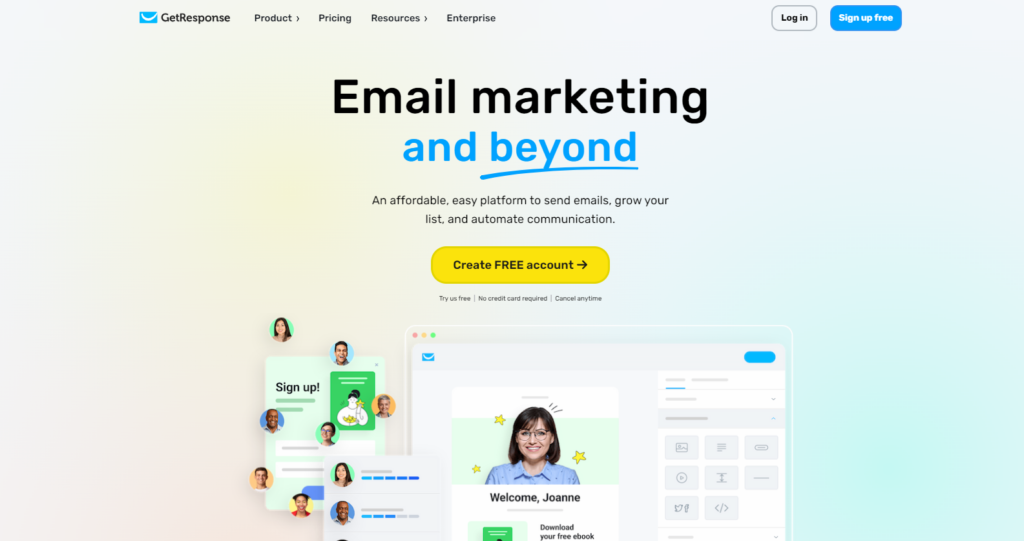
Rounding out our list of email marketing platforms for eCommerce is GetResponse, a platform that has significantly enhanced its eCommerce capabilities in recent years.
Key Features for eCommerce
- Conversion Funnels: Build complete marketing funnels, from landing pages to email sequences to conversion tracking.
- Webinar Hosting: Integrate webinars into your marketing strategy with built-in webinar functionality.
- Advanced Segmentation and Personalization: Create highly targeted campaigns based on subscriber data and behaviors.
- Ecommerce-Specific Automations: Set up workflows for cart abandonment, post-purchase follow-ups, and product recommendations.
- Website Builder: Create and host simple websites or landing pages directly within the platform.
Why GetResponse Stands Out
- All-in-One Marketing Solution: GetResponse offers a comprehensive set of tools beyond just email, including landing pages, webinars, and basic CRM features.
- Focus on Conversions: The platform is designed with a strong emphasis on driving conversions, from email sign-ups to product purchases.
- Robust Automation Capabilities: Create sophisticated automated workflows to nurture leads and drive sales.
- Competitive Pricing: GetResponse often offers more features at lower price points compared to some competitors.
Who Should Consider GetResponse?
- eCommerce Businesses Focused on Funnel Marketing: If your strategy involves complex marketing funnels, GetResponse’s tools are well-suited to this approach.
- Businesses Leveraging Webinars: The integrated webinar functionality can be a game-changer for businesses using webinars as part of their sales strategy.
- Growing Online Retailers: The platform scales well, offering features that can support businesses as they expand.
Potential Drawbacks
- Interface Complexity: Some users find the interface less intuitive compared to simpler platforms, especially when using advanced features.
- Limited Deep eCommerce Integrations: While improving, GetResponse may not offer as deep integrations with eCommerce platforms as some specialized competitors.
- Email Template Variety: While functional, some users find the range of email templates somewhat limited.
With these additional platforms, we’ve now covered a comprehensive list of 9 best email marketing platforms for eCommerce in 2024, providing a range of options to suit various business needs and preferences.
Choosing the Best Email Marketing Platform for Your eCommerce Business
After diving deep into these top email marketing platforms for eCommerce, it’s clear that each has its own strengths and ideal use cases.
Here are the key takeaways to help you make an informed decision:
Know Your Needs
- Assess your current email marketing capabilities
- Identify gaps in your strategy
- Determine your growth projections
Focus on eCommerce-Specific Features
- Look for platforms with deep eCommerce integrations
- Prioritize advanced segmentation and personalization capabilities
- Ensure robust automation features for cart abandonment, post-purchase follow-ups, etc.
Consider Scalability
- Choose a platform that can grow with your business
- Look at pricing structures for higher subscriber counts
- Evaluate the depth of features available at different plan levels
Evaluate Ease of Use vs. Power
- Balance the need for advanced features with usability
- Consider the learning curve and available resources for each platform
- Assess the technical capabilities of your team
Analyze Reporting and Analytics
- Prioritize platforms that offer deep insights into revenue attribution
- Look for predictive analytics and customer lifetime value metrics
- Ensure the platform can integrate with your other analytics tools
Don’t Neglect Deliverability
- Research the deliverability rates of each platform
- Look for built-in tools to maintain list hygiene and improve inbox placement
Consider Multi-Channel Capabilities
- Evaluate platforms that offer integrated SMS, social media, or web push notifications
- Consider how email fits into your overall marketing strategy
Remember, the best email marketing platform for eCommerce isn’t necessarily the one with the most features or the highest price tag.
It’s the one that aligns best with your business goals, technical capabilities, and growth trajectory.
Take Your eCommerce Email Marketing to the Next Level
We’ve covered a lot of ground in exploring the best email marketing platforms for eCommerce in 2024.
From the all-in-one power of Mailchimp to the eCommerce specialization of Klaviyo, the innovative features of Omnisend, the personalization prowess of Drip, and the automation mastery of ActiveCampaign, there’s no shortage of powerful tools at your disposal.
But here’s the truth:
The platform you choose is just the beginning.
It’s what you do with it that counts.
The most sophisticated email marketing platform in the world won’t make a difference if you’re not using it to its full potential.
So, as you evaluate these platforms and make your choice, remember this:
Your success in eCommerce email marketing doesn’t just depend on the tool you use.
It depends on your strategy, your creativity, and your commitment to understanding and serving your customers.
Choose the platform that best enables your vision, then roll up your sleeves and get to work.
Test, optimize, and never stop learning.
Your customers’ inboxes are waiting, and with the right platform and approach, you have the power to turn those inboxes into a direct line to increased sales and customer loyalty.
The world of eCommerce is evolving rapidly, and email marketing remains a cornerstone of success.
By choosing the right platform and leveraging it effectively, you’re not just keeping up with the competition – you’re positioning yourself to lead the pack.
Now, go make those emails count.
Read also:
FAQ on Email Marketing Platforms for eCommerce
What’s the difference between a general email marketing platform and one specialized for eCommerce?
eCommerce-specific platforms typically offer deeper integration with online stores, advanced product recommendation features, and automation tools tailored for actions like abandoned cart recovery and post-purchase follow-ups. They also often provide more detailed revenue attribution and customer lifecycle analytics.
How important is automation in eCommerce email marketing?
Automation is crucial for eCommerce email marketing. It allows you to send timely, relevant messages based on customer behavior, such as welcome series, abandoned cart reminders, and replenishment reminders. This not only saves time but also significantly improves the effectiveness of your email campaigns.
Can I use multiple email marketing platforms for different aspects of my eCommerce business?
While it’s possible, it’s generally not recommended. Using a single platform for all your email marketing efforts ensures data consistency, simplifies workflow, and provides a unified view of your customer interactions and campaign performance.
How do I determine the right budget for an email marketing platform?
Consider factors like the size of your email list, the complexity of your email marketing strategy, and your overall marketing budget. Many platforms offer tiered pricing based on subscriber count. A good rule of thumb is to aim for an ROI of at least 4-5 times your email marketing spend.
Are there any free email marketing platforms suitable for eCommerce?
While there are free tiers available for some email marketing platforms, they often have limited features and subscriber counts. For most eCommerce businesses, investing in a paid platform is worthwhile for access to advanced eCommerce-specific features and scalability.
Remember, these platforms are constantly evolving, so it’s a good idea to take advantage of free trials when available to test the features that matter most to your eCommerce business.
Read also:

